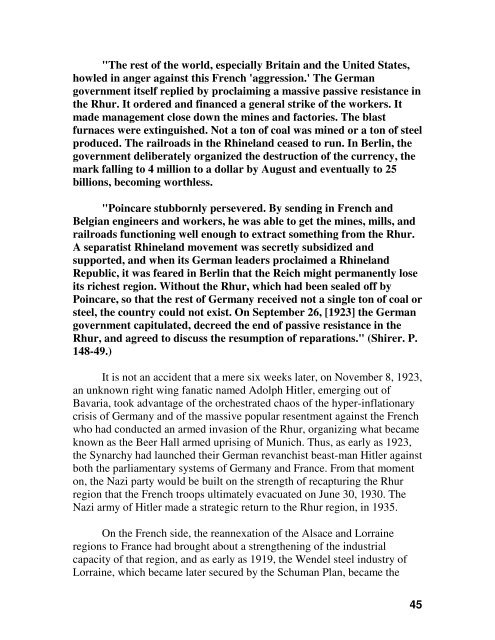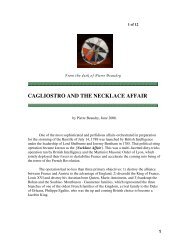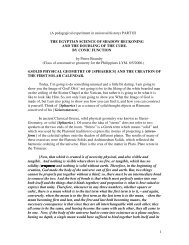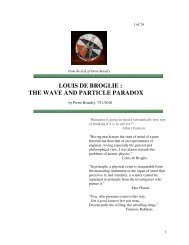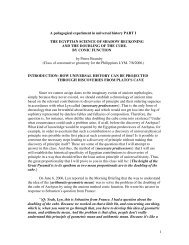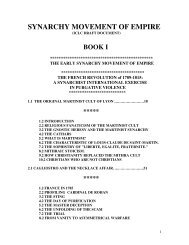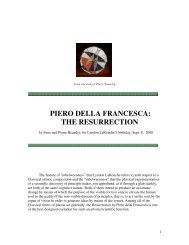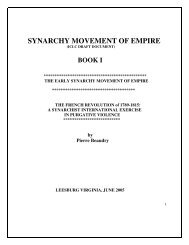synarchy movement of empire book ii - Pierre Beaudry's Galactic ...
synarchy movement of empire book ii - Pierre Beaudry's Galactic ...
synarchy movement of empire book ii - Pierre Beaudry's Galactic ...
You also want an ePaper? Increase the reach of your titles
YUMPU automatically turns print PDFs into web optimized ePapers that Google loves.
"The rest <strong>of</strong> the world, especially Britain and the United States,<br />
howled in anger against this French 'aggression.' The German<br />
government itself replied by proclaiming a massive passive resistance in<br />
the Rhur. It ordered and financed a general strike <strong>of</strong> the workers. It<br />
made management close down the mines and factories. The blast<br />
furnaces were extinguished. Not a ton <strong>of</strong> coal was mined or a ton <strong>of</strong> steel<br />
produced. The railroads in the Rhineland ceased to run. In Berlin, the<br />
government deliberately organized the destruction <strong>of</strong> the currency, the<br />
mark falling to 4 million to a dollar by August and eventually to 25<br />
billions, becoming worthless.<br />
"Poincare stubbornly persevered. By sending in French and<br />
Belgian engineers and workers, he was able to get the mines, mills, and<br />
railroads functioning well enough to extract something from the Rhur.<br />
A separatist Rhineland <strong>movement</strong> was secretly subsidized and<br />
supported, and when its German leaders proclaimed a Rhineland<br />
Republic, it was feared in Berlin that the Reich might permanently lose<br />
its richest region. Without the Rhur, which had been sealed <strong>of</strong>f by<br />
Poincare, so that the rest <strong>of</strong> Germany received not a single ton <strong>of</strong> coal or<br />
steel, the country could not exist. On September 26, [1923] the German<br />
government capitulated, decreed the end <strong>of</strong> passive resistance in the<br />
Rhur, and agreed to discuss the resumption <strong>of</strong> reparations." (Shirer. P.<br />
148-49.)<br />
It is not an accident that a mere six weeks later, on November 8, 1923,<br />
an unknown right wing fanatic named Adolph Hitler, emerging out <strong>of</strong><br />
Bavaria, took advantage <strong>of</strong> the orchestrated chaos <strong>of</strong> the hyper-inflationary<br />
crisis <strong>of</strong> Germany and <strong>of</strong> the massive popular resentment against the French<br />
who had conducted an armed invasion <strong>of</strong> the Rhur, organizing what became<br />
known as the Beer Hall armed uprising <strong>of</strong> Munich. Thus, as early as 1923,<br />
the Synarchy had launched their German revanchist beast-man Hitler against<br />
both the parliamentary systems <strong>of</strong> Germany and France. From that moment<br />
on, the Nazi party would be built on the strength <strong>of</strong> recapturing the Rhur<br />
region that the French troops ultimately evacuated on June 30, 1930. The<br />
Nazi army <strong>of</strong> Hitler made a strategic return to the Rhur region, in 1935.<br />
On the French side, the reannexation <strong>of</strong> the Alsace and Lorraine<br />
regions to France had brought about a strengthening <strong>of</strong> the industrial<br />
capacity <strong>of</strong> that region, and as early as 1919, the Wendel steel industry <strong>of</strong><br />
Lorraine, which became later secured by the Schuman Plan, became the<br />
45


